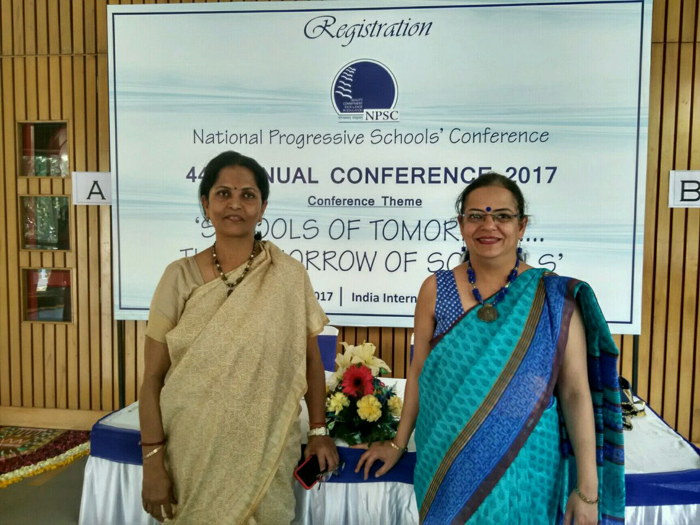Representation at the NPSC 44th Annual Conference, 2017.
Principal, Ms. Tania Joshi, Ms. Sunita Singh and Ms. Chanda Sharma attended the NPSC 44th Annual Conference 2017 at the India International Centre on 16th and 17th February, 2017. Mr. K.C. Singh Former Ambassador and Secretary, Ministry of External Affairs was the keynote speaker. He spoke of the major challenge our government is facing, namely, bridging the gap of education between the private and government schools in our country.
Mr. Ashok Pandey, Chairman, NPSC, then handed over the Life Time Achievement Award to Mr. G. S. Negi, accomplished teacher if Geography and Principal, Bhartiya Vidya Bhawan, for his extensive contribution to the field of innovative education.
The theme of the Annual NPSC Conference this year was Schools of Tomorrow..the Tomorrow of Schools. Mr. Pandey said that the theme was very powerful in the context of education today. Transformation to the next level can be achieved only through innovation. We cannot afford to be doing the same old things in a changing global environment. Teacher empowerment and involvement through regular objective-oriented training and technology-adoption, are keys to this transformation.
[gallery link="file"]
Chief guest, Dr. R.K. Chaturvedi, IAS, delivered the valedictory address by stressing on the need of a multi-disciplinary approach, with a focus on solving problems. This clearly requires teamwork and communication, which in turn, widely help every school to excel.
The speakers on the topic Learning for Global Competencies were Ms. Nina Vaskunlahti, (Ambassador of Finland to India) and Dr. Amanda Day (Counsellor of Education at the Australian High Commission). The prevailing education systems in Finland and Australia were shared with the educationists present at the conference. Their goal of schooling is indisputably self-development and mastery through empowerment, unleashing passion and a continued quest for excellence.
Ms. Nina Vaskunlahti also shared that students in Finland did not attend schools only to learn content but to learn a life long skills through interactions with their peers and therefore, with society. Eventually when a child leaves school, he/she is ready to run a household on his/her own and even possesses excellent communication skills to interact with the world beyond.
Finally Prof. M. M. Pant (Founder, LMP, Education Trust) discussed new pedagogies for transformative technologies. He said that schools have to place themselves and their students at the heart of a learning society, use social innovation, new technologies and new models of provision to deliver high quality learning anywhere, anytime.
The second days session began with Mr. L.V. Sehgal (Principal, Bal Bharati School) who welcomed the first speaker of the day Mr. Ratan. P. Watal (IAS, Principal Advisor, Niti Aayog). Mr. Watal said that education teaches sanskara in schools. According to him, schooling in the true sense, implies learning multi-tasking and getting geared to handle change.
The second speaker, Mr. Subir Shukla (Principal Coordinator, IGNUS), stressed on educational improvement as a holistic change-process which seeks to deliver actual, visible changes in classroom processes to enable learners and teachers to attain expected outcomes (especially high-order ones). Mr. Shukla broadly laid stress on the principle of ERAC which means to engage and experiment, reflect, apply and conclude; implying the development of skills beyond content. We, as teachers, need to build on knowledge which children already bring into the classroom, he said. If we want our children to become more resourceful then enable them to plan and execute the issues that matter to them.
The third speaker Ms. Chandrima Sinha (Vice-President, Invest India) said that youth today should think and acquire skills to build products which they can use later as an enterprise. Regardless whether the venture works or fails , learning has taken place.
The fourth speaker, Lt. Gen. Vijay Oberoi (Former Vice Chief of Army Staff) said that teachers should have the intuitive ability to judge their students.
The fifth speaker, Ms. Sanjana Kapoor, theatre personality, said that our country has a rich diversity of the performing arts and therefore theatre classes are important in schools. Drama ushers us to connect to many sensorial levels, she said. Teachers need to create their own little infrastructure in a class according to the required needs. A short video of a performing art school run by her named Junoon in Mumbai was shown to the audience.
It was an enriching experience to hear the views of NPSC members who support quality education through innovative practices, both for scholastic and co-scholastic learning outcomes.
Ms. Chanda Sharma.













